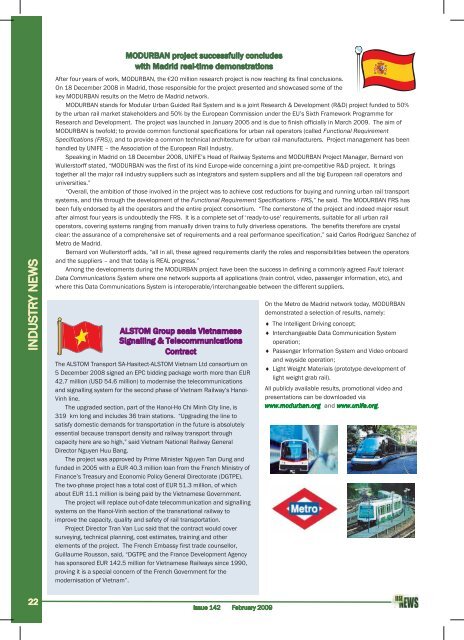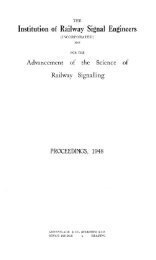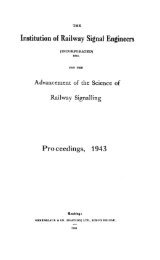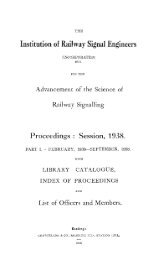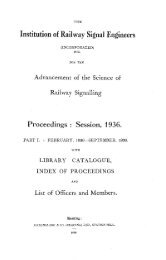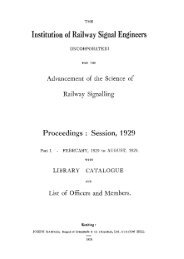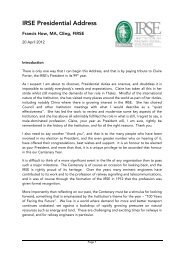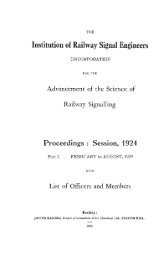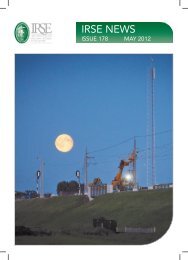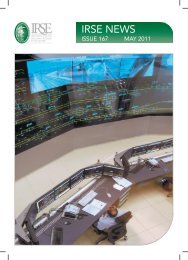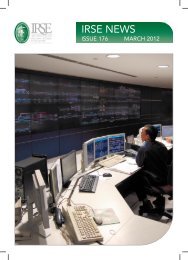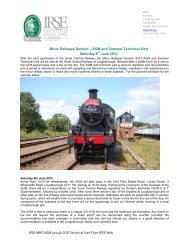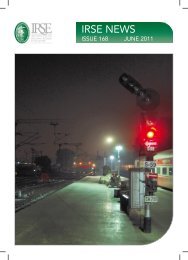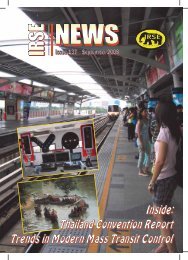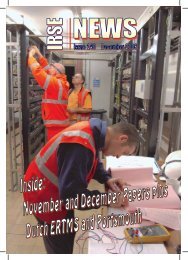IRSE News 142 Feb 09.pdf
IRSE News 142 Feb 09.pdf
IRSE News 142 Feb 09.pdf
Create successful ePaper yourself
Turn your PDF publications into a flip-book with our unique Google optimized e-Paper software.
INDUSTRY NEWS<br />
MODURBAN project successfully concludes<br />
with Madrid real-time demonstrations<br />
After four years of work, MODURBAN, the €20 million research project is now reaching its final conclusions.<br />
On 18 December 2008 in Madrid, those responsible for the project presented and showcased some of the<br />
key MODURBAN results on the Metro de Madrid network.<br />
MODURBAN stands for Modular Urban Guided Rail System and is a joint Research & Development (R&D) project funded to 50%<br />
by the urban rail market stakeholders and 50% by the European Commission under the EU’s Sixth Framework Programme for<br />
Research and Development. The project was launched in January 2005 and is due to finish officially in March 2009. The aim of<br />
MODURBAN is twofold; to provide common functional specifications for urban rail operators (called Functional Requirement<br />
Specifications (FRS)), and to provide a common technical architecture for urban rail manufacturers. Project management has been<br />
handled by UNIFE – the Association of the European Rail Industry.<br />
Speaking in Madrid on 18 December 2008, UNIFE’s Head of Railway Systems and MODURBAN Project Manager, Bernard von<br />
Wullerstorff stated, “MODURBAN was the first of its kind Europe-wide concerning a joint pre-competitive R&D project. It brings<br />
together all the major rail industry suppliers such as integrators and system suppliers and all the big European rail operators and<br />
universities.”<br />
“Overall, the ambition of those involved in the project was to achieve cost reductions for buying and running urban rail transport<br />
systems, and this through the development of the Functional Requirement Specifications - FRS,” he said. The MODURBAN FRS has<br />
been fully endorsed by all the operators and the entire project consortium. “The cornerstone of the project and indeed major result<br />
after almost four years is undoubtedly the FRS. It is a complete set of ‘ready-to-use’ requirements, suitable for all urban rail<br />
operators, covering systems ranging from manually driven trains to fully driverless operations. The benefits therefore are crystal<br />
clear: the assurance of a comprehensive set of requirements and a real performance specification,” said Carlos Rodriguez Sanchez of<br />
Metro de Madrid.<br />
Bernard von Wullerstorff adds, “all in all, these agreed requirements clarify the roles and responsibilities between the operators<br />
and the suppliers – and that today is REAL progress.”<br />
Among the developments during the MODURBAN project have been the success in defining a commonly agreed Fault tolerant<br />
Data Communications System where one network supports all applications (train control, video, passenger information, etc), and<br />
where this Data Communications System is interoperable/interchangeable between the different suppliers.<br />
ALSTOM Group seals Vietnamese<br />
Signalling & Telecommunications<br />
Contract<br />
The ALSTOM Transport SA-Hasitect-ALSTOM Vietnam Ltd consortium on<br />
5 December 2008 signed an EPC bidding package worth more than EUR<br />
42.7 million (USD 54.6 million) to modernise the telecommunications<br />
and signalling system for the second phase of Vietnam Railway’s Hanoi-<br />
Vinh line.<br />
The upgraded section, part of the Hanoi-Ho Chi Minh City line, is<br />
319 km long and includes 36 train stations. “Upgrading the line to<br />
satisfy domestic demands for transportation in the future is absolutely<br />
essential because transport density and railway transport through<br />
capacity here are so high,” said Vietnam National Railway General<br />
Director Nguyen Huu Bang.<br />
The project was approved by Prime Minister Nguyen Tan Dung and<br />
funded in 2005 with a EUR 40.3 million loan from the French Ministry of<br />
Finance’s Treasury and Economic Policy General Directorate (DGTPE).<br />
The two-phase project has a total cost of EUR 51.3 million, of which<br />
about EUR 11.1 million is being paid by the Vietnamese Government.<br />
The project will replace out-of-date telecommunication and signalling<br />
systems on the Hanoi-Vinh section of the transnational railway to<br />
improve the capacity, quality and safety of rail transportation.<br />
Project Director Tran Van Luc said that the contract would cover<br />
surveying, technical planning, cost estimates, training and other<br />
elements of the project. The French Embassy first trade counsellor,<br />
Guillaume Rousson, said, “DGTPE and the France Development Agency<br />
has sponsored EUR <strong>142</strong>.5 million for Vietnamese Railways since 1990,<br />
proving it is a special concern of the French Government for the<br />
modernisation of Vietnam”.<br />
On the Metro de Madrid network today, MODURBAN<br />
demonstrated a selection of results, namely:<br />
The Intelligent Driving concept;<br />
Interchangeable Data Communication System<br />
operation;<br />
Passenger Information System and Video onboard<br />
and wayside operation;<br />
Light Weight Materials (prototype development of<br />
light weight grab rail).<br />
All publicly available results, promotional video and<br />
presentations can be downloaded via<br />
www.modurban.org and www.unife.org.<br />
22<br />
Issue <strong>142</strong> <strong>Feb</strong>ruary 2009


